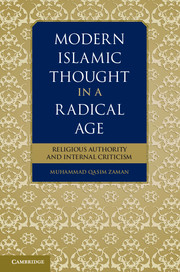Book contents
- Frontmatter
- Contents
- Acknowledgments
- A Note on Transliteration, Spelling, and Other Conventions
- Map
- 1 Introduction
- Part One
- Part Two
- 5 Bridging Traditions: Madrasas and their Internal Critics
- 6 Women, Law, and Society
- 7 Socioeconomic Justice
- 8 Denouncing Violence: The Ambiguities of a Discourse
- 9 Epilogue: The Paradoxes of Internal Criticism
- Bibliography
- Index
- References
9 - Epilogue: The Paradoxes of Internal Criticism
Published online by Cambridge University Press: 05 November 2012
- Frontmatter
- Contents
- Acknowledgments
- A Note on Transliteration, Spelling, and Other Conventions
- Map
- 1 Introduction
- Part One
- Part Two
- 5 Bridging Traditions: Madrasas and their Internal Critics
- 6 Women, Law, and Society
- 7 Socioeconomic Justice
- 8 Denouncing Violence: The Ambiguities of a Discourse
- 9 Epilogue: The Paradoxes of Internal Criticism
- Bibliography
- Index
- References
Summary
This book has examined some of the ways in which Islamic thought, practices, and institutions are debated and critiqued by the `ulama in the modern world. I have studied only a fraction of these debates here, but even this small sample should provide us with a sense of the range of issues – the authority of consensus, the refashioning of legal norms, discourses on the common good, education, the position of women, socioeconomic justice, violence and terrorism – that have often been taken up for commentary and critique. At its broadest, the significance of these debates lies in illuminating the sort of intellectual ferment that exists in the Muslim public and religious spheres and specifically in the ranks of the `ulama. But they also tell us much about how particular issues are tackled, the ways in which their varied contexts shape and constrain these debates, how they are informed by a scholarly tradition that is itself in the process of reconstitution, and how authority is both contested and claimed in this unstable milieu.
In studying facets of Islamic reformist thought, I have frequently drawn attention to the idiom and the rhetorical language in which particular arguments are couched. This raises the question of the relationship between the rhetoric of reform and its content. It also poses the problem of the tangible influence of reformist thought, of course, though the latter question requires a different, empirical, examination, and it has had to be left aside here. What of the tension and the gap between rhetoric and substance, then? Qaradawi, for one, is often far more accommodating of the agreed-upon norms of the medieval jurists than his putative effort to limit the scope of consensus to the “constants of the community” would suggest. For his part, Anwarshah Kashmiri was unusual among Deobandis of his age in the early twentieth century in the degree of his openness to possibilities of ijtihad. Yet there is little clear indication in his writings of any substantive issues on which he proposed it. And Rashid Rida's thoroughgoing critique of his fellow `ulama scarcely precluded unacknowledged agreement with them on many important matters.
- Type
- Chapter
- Information
- Modern Islamic Thought in a Radical AgeReligious Authority and Internal Criticism, pp. 309 - 322Publisher: Cambridge University PressPrint publication year: 2012



